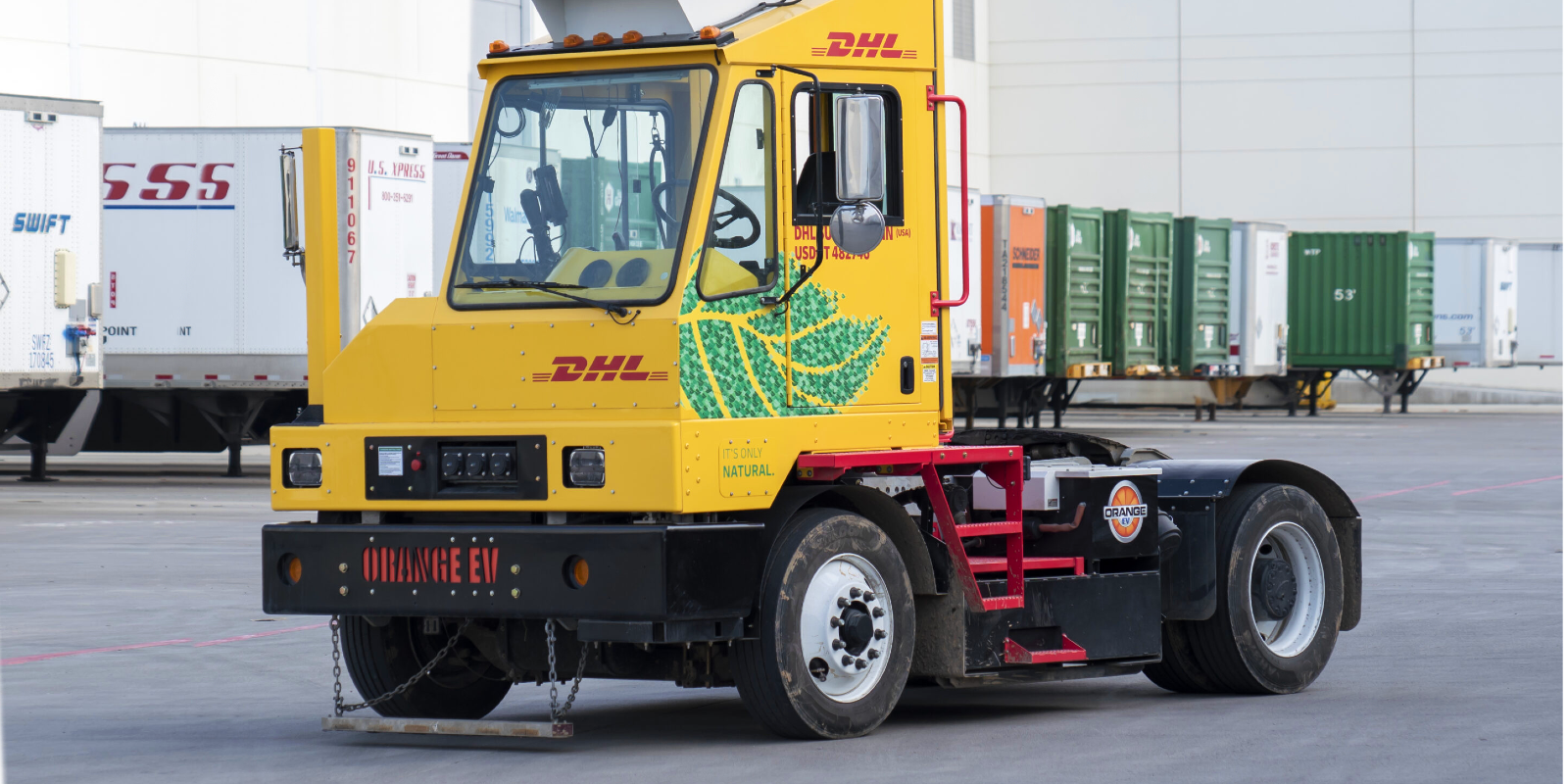
DHL was the first major company to put an all-electric class 8 yard truck into service in 2015. Now, DHL has 50 electric yard trucks from Orange EV in its logistics fleet, with plans to fully phase out diesel trucks by 2025.
Whether you call them terminal trucks, yard dogs, mules, or anything else, these heavy-duty trucks do work that’s ideally suited to electrification. It’s all low-speed, extreme-torque, short distance, high-precision operation, all the time. And the quiet, vibration-free, instant power operation of electric drive is in its element. DHL knows this better than most, which is why the company has electric yard trucks currently deployed at more than 30 DHL Supply Chain sites across the US – all part of DHL’s goal to both phase out diesel trucks by 2025 and reducing logistics-related carbon emissions to net zero by 2050.
“We cannot ignore the impact our operations have on the environment as a logistics company and therefore we are committed to implementing more sustainable approaches to doing business,” explains Stephan Schablinski, VP of “GoGreen” initiatives at DHL Supply Chain. “Through partnerships with companies like Orange EV we have been able to develop innovative solutions that reimagine the industry of logistics and take us closer to a green future.”
It’s worth noting, too, that the those first electric yard trucks DHL put into service back in 2015. Affectionally dubbed “Sparky I” and “Sparky II,” the electric semi trucks have individually clocked more than 24,000 hours and 17,000 hours of operation. What’s more: they’re still on their original battery packs.
“DHL Supply Chain’s first two Orange EV orders are a great example of how we work together to right-size a fleet’s EV projects to economically meet site specifications and rigorous duty cycles,” says Kurt Neutgens, Orange EV co-founder, President, and CTO. “DHL Supply Chain first purchased an Extended Duty truck and charger … and DHL’s well-trained, committed team maximized opportunity charging to keep both trucks running at peak efficiency.”
DHL Supply Chain announced plans to double its current electric yard truck fleet last month – a move that would bring them to 100 all-electric Orange EV class 8 trucks and 0 diesels over the next two years.
Electrek’s Take
There was a line in Orange EV’s press release that’s been playing “on repeat” in my head since I read it. “Diesel yard trucks which are often used just 5 years or 15,000 hours before maintenance and repair costs become prohibitively expensive,” it reads. “In its deployed fleet, Orange EV currently has 35 trucks exceeding 15,000 hours of operation – 14 of which have surpassed 20,000 hours – with many more that will cross those thresholds soon.”
I called Mike Switzer, my co-host on The Heavy Equipment Podcast and a fleet manager who’s tracked thousands of assets in his twenty-plus years in the industry, and asked him if that sounded right.
“Here’s the thing,” he said. “Typically, on-road fleets are tracked in miles. We do oil changes every 5-10,000 miles and try to maintain a 400-500,000 overhaul on the heavy equipment trucks. That’s barring clutch replacements, if needed, stuff that gets messed up. Now, with the automated manuals, a lot of that goes out the window and it all makes it to the rebuild point where we down the truck (hopefully scheduled) between 400 and 500,000 miles, so 15,000 hours you’re right there. Obviously a heavy haul places a bigger toll on the powertrain vs. someone that’s pulling general freight, but some of the general freight guys are going 900,000 or even a million miles on an engine just because of the work load. That’s not to say there’s not a place for electric, there definitely is and I think the yards and ports are a great place for it, but I wouldn’t say that 15,000 hours is any kind of real limit.”
Some quick, back-of-the napkin math tells me that 15,000 hours times an average 30 MPH would put us at 450,000 miles. Right in Mike’s 400-500,000 mile rebuild window, in other words. Admittedly, 30 MPH is high for a terminal truck, but the constant heavy load stop-and-go nature of a yard truck’s day to day more than makes up the difference in my view … and the fact that we’re talking about trucks that are coming up on 9 years of continuous heavy duty operation on the original batteries?
EVs can’t get a much better endorsement than that.
FTC: We use income earning auto affiliate links. More.





Comments